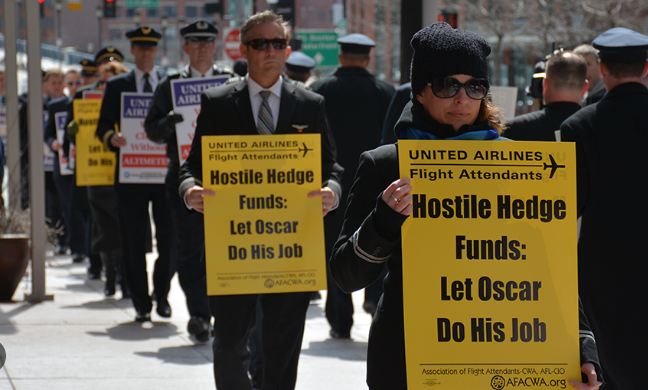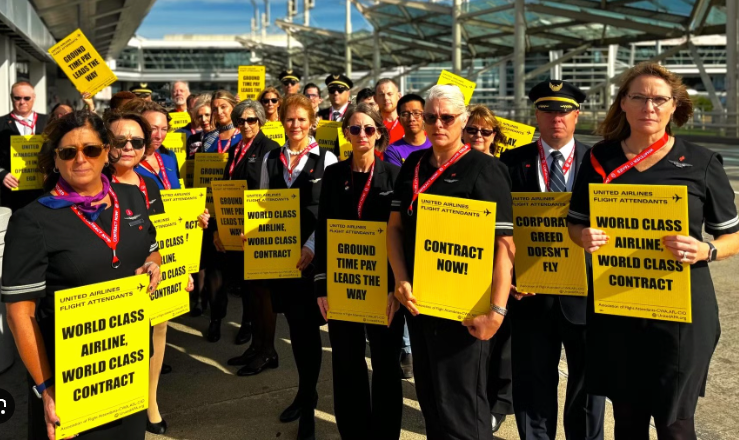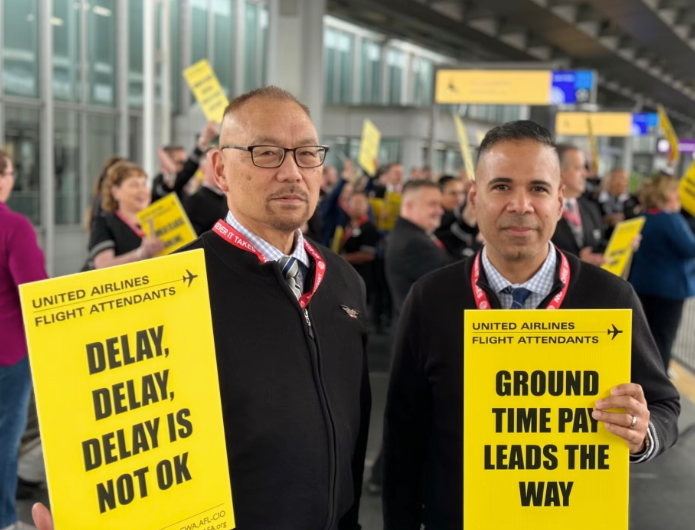Union leadership denies responsibility for stalled United negotiations
- icarussmith20
- Oct 29, 2024
- 4 min read
Earlier this month, United Airlines announced that it was launching a $1.5 billion share buyback scheme, as the carrier reported higher-than-expected earnings for its third quarter. The news was met with immediate backlash from the union representing United flight attendants as it argued that share buyback schemes should be banned in entirety.
United Airlines made headlines for its new share buyback programme which is the first for the airline carrier since the Covid-19 pandemic. Between 2020 to 2022 buyback schemes were banned across the industry as a condition of the government’s $50 billion aid package for US airlines.
In response to United’s announcement, the Association of Flight Attendants-CWA (AFA) International President Sara Nelson and United AFA President Ken Diaz released a statement, describing the stock buyback scheme as a “huge mistake”. Nelson and Diaz argued that “stock buybacks are a sickness that hurts workers and consumers alike”, adding that the “money just promised to Wall Street” belongs to flight attendants.
In the statement, Nelson and Diaz acknowledge that United has signed new contracts with “all other employee groups but flight attendants”. However, this acknowledgement begs the question as to whether Nelson and AFA-CWA deserve to take some responsibility for being unable to secure a contract for their members The union leadership is banking on the inflammatory rhetoric distracting United flight attendants from the stark reality that while United reports higher profits, they still remain on pre-pandemic stagnant pay.

As we have highlighted in a previous blog, United Airlines’ flight attendants voted overwhelmingly to strike back in August, with 99.99% supporting industrial action. Diaz and Nelson’s statement reiterate AFA-CWA’s warning that United management needs to pay or face “CHAOS”. However, they conveniently do not mention that the ability to sow disruption through striking is blunted by strict legislation dictating labor negotiations.
Under the Railway Labor Act, the National Mediation Board (NMB) needs to decide that negotiations between unions and management have reached an “impasse” and release both parties into a 30-day “cooling off period”. It is only after this period has lapsed, that United flight attendants would be able to strike. However, it could still be blocked if the White House decides to intervene and avert the strike.

One of the errors of Diaz and Nelson’s joint statement is using the language of what United flight attendants are owed because it opens the door into all the other basic working conditions that United flight attendants deserve. First and foremost, United flight attendants deserve a union that can effectively bargain and secure a contract. They deserve quick and painless negotiation periods that result in pay that adequately reflects the economic climate and inflation. This lies as much with AFA-CWA leadership as it does with United management.
Time is running out for AFA-CWA to prove themselves and end these drawn-out negotiations with research showing that while the typical US union member still has higher earnings than workers who are not covered by a union, the pay disparity between unionised and non-unionised working group is closing. As recently highlighted in an article by the Wall Street Journal, unionized flight attendants like United, have been locked into multi-year collective bargaining contracts that were signed before the post pandemic inflation surge.
United flight attendants also deserve boarding pay, which has become more of a norm since non-unionised Delta Air Lines decided to unilaterally introduce boarding pay for all its flight attendants back in April 2022. While negotiations at United remain stagnant, American Airlines has been able to follow Delta’s lead and introduce boarding pay for flight attendants as part of its new deal.

Nelson would prefer to ban buyback schemes in their entirety rather than consider how the scheme could be opened up to benefit United flight attendants. The irony is that unions are often a blockage rather than an accelerator to securing better working conditions for flight attendants. After years of being on opposing sides and divisive language, similar to Diaz and Nelson’s recent statement, it’s not hugely surprising that United management has opened shares to Wall Street rather than their own flight attendants.
In contrast, Delta has been able to roll out a lucrative profit-sharing agreement for all of its workers, including flight attendants and considers it crucial to the airline's culture. This is partly the result of being non-unionized and therefore having the freedom to roll out benefits without endless labor negotiations. Since 2015, Delta has rewarded employees with over $8 billion in profit sharing. In 2023 alone, employees received a share of $1.4 billion in Delta’s profits.
Time is running out for United management; they need to secure a deal or risk members revolting. With no deal on the horizon and competitors like Delta and American introducing profit-sharing schemes and boarding pay, United flight attendants are soon going to be questioning the purpose of AFA-CWA. Overall, Diaz and Nelson would be wise to spend less time on inflammatory rhetoric and more time focusing on how they can secure a deal for United flight attendants. After all, this is what they deserve.
Comments